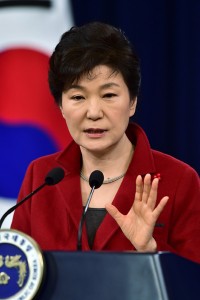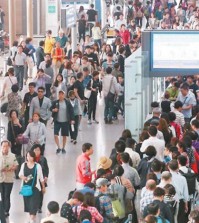- California Assembly OKs highest minimum wage in nation
- S. Korea unveils first graphic cigarette warnings
- US joins with South Korea, Japan in bid to deter North Korea
- LPGA golfer Chun In-gee finally back in action
- S. Korea won’t be top seed in final World Cup qualification round
- US men’s soccer misses 2nd straight Olympics
- US back on track in qualifying with 4-0 win over Guatemala
- High-intensity workout injuries spawn cottage industry
- CDC expands range of Zika mosquitoes into parts of Northeast
- Who knew? ‘The Walking Dead’ is helping families connect
S. Korea ranks highest for ‘government transparency’ among OECD countries
By Kim Yoo-chul
Korea ranked as the leader among the Organization for Economic Cooperation and Development (OECD) countries in leading initiatives in Open Government Data (OGD), OECD said late Monday.
Korea received 0.98 points in the OGD index and this was far higher than the OECD average of 0.58 points. The runner-up was France, followed by the United Kingdom, Australia, Canada and the United States.
Japan came 14th in the survey.
“Korea ranks first in this year’s Open, Useful, Reusable Government data Index (OUR data Index), which looks at the level of availability and accessibility of government data on a national portal and the level of government support for the reuse of data in creating public value,” OECD said in its evaluation sheet.
Highlighting Korea’s achievement, the organization added; “Opening up public data and fostering its reuse by citizens and businesses as well as inside the public administration is a key strategic priority of the ‘Government 3.0′ initiative launched by the Korean government in 2013.”
In a statement, the Ministry of Government Administration and Home Affairs said the government agency will step up its efforts to share more government data with private firms.
“The government has opened data up for use in building projects and approval for administrative practices for local governments and other finance data in the first half of this year. It will release more government data on the real estate industry,” the statement said.
The government will release data for use in health and education, which it believes has huge growth potential, by the end of 2017 according to its internal schedule.
“By opening more government data, the ministry hopes to create new services, more jobs and new business models, which are part of the government drive for the creative economy,” the statement added.
OGD has far-reaching effects that go beyond direct economic gain. OGD implies that the public sector relinquishes its role as an information gatekeeper in lieu of a new role as an information publisher.
It involves a realignment of the power dynamics between the public and private sectors.
“Being free for use is of course not the same as being free of use; however it is common in the economic discussion to interpret the concept of openness as meaning that the data is and should be free of charge,” said an official at the ministry.
For this year’s performance, the OECD praised Korea’s higher ratio to reuse government data for the development of new applications fitted with mobile devices.
The OECD expects Korea to play a key role in creating a mature OGD ecosystem, highlighting its commitment to actively reuse the government data.















![넷플릭스 2025년 라인업 공개 [넷플릭스 제공. 재판매 및 DB 금지]](http://www.koreatimesus.com/wp-content/uploads/2025/04/20250415135202671-copy-120x134.jpg)
